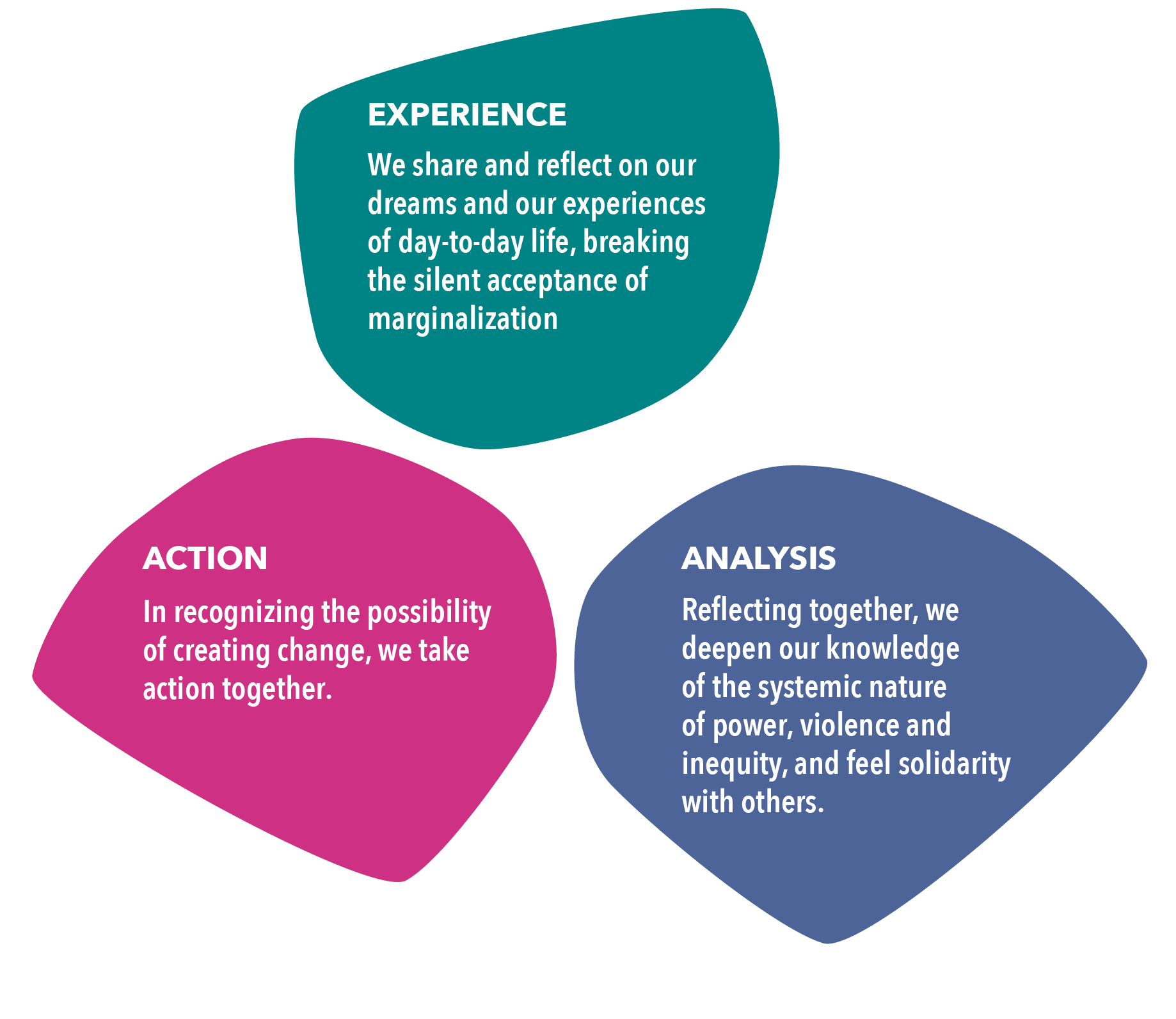Feminist Popular Education
Feminist popular education
The master’s tools will never dismantle the master’s house.
Audre Lorde
IN BRIEF
The JASS community is steeped in a particularly political way of learning, analyzing, and taking action. From the beginning, this approach – feminist popular education – has shaped JASS’ vision and strategies.

Feminist popular education is action-oriented so it moves through a continuing cycle of reflection and analysis, action and transformation.
Popular education
is an approach to literacy, political education, and organizing that invites people to reflect on their lived experience, as a way to “de-normalize” oppression and inspire strategies to challenge the status quo. It focuses on class.
Feminist popular education
adds a specific exploration of intersecting power dynamics – including those of gender, race, and sexual identity – that silence and exclude people. It includes our bodies and ‘personal’ lives as part of the story of oppression and liberation, in order to give rise to truly transformative strategies for everyone.
The word “popular” in popular education does not mean fun or cool (as in a pop song), but refers to a vision of the common good – “of, for and by the people.”
IN JASS
JASS’ movement building is rooted in a practice of on-going feminist popular education with activists. We see it as central to individual and collective liberation.
Feminist popular education creates space and processes to:
● affirm and build on people’s intelligence, knowledge, and analytical capacity
● foster critical thinking and questions about why things are the way they are
● “de-normalize” injustice and inequity
● fuel people’s courage, hope, and sense of community
● investigate and challenge power that keeps us silent and resigned
● unleash people’s imagination about other possibilities and their collaborative power to make for change
IN ACTION
IN DEPTH
Popular education is attributed to radical Brazilian educator Paulo Freire, from his consciousness-raising literacy work with peasant farmers, as a “practice of freedom.”
When feminists encountered Freire’s ideas, many identified with his understanding of oppression and the role of consciousness-raising linked to organizing and action in undoing it. However, they challenged his singular focus on class as the source of all oppression and found a glaring omission in that his analyses ignored inequalities in the private sphere. Thus, feminist activists made visible the multiple and intersecting dynamics of social exclusion and oppression—gender, class, sexual orientation, age, nationality, ethnicity, and the myriad other identities around which social hierarchies are built.
Read more in this paper by JASS founders, Lisa Veneklasen and Valerie Miller.
Read more: Feminist Hiking Collective interviewed Patricia Ardón (JASS Mesoamerica) and Shereen Essof (JASS Director) about our practice of feminist popular education.
IN MANY VOICES
Feminist popular education is about liberating ourselves to build a future we have not seen yet.
JASS
When we talk about radical healing, it involves going deep, to unlearn, and unlearning is perhaps the main challenge in feminist popular education – to unlearn what we have learned all of our lives and learn a new way of seeing and living.
Patricia Ardón, JASS Mesoamerica, interviewed by The Feminist Hiking Collective

IN GROUPS
People are energized by a highly participatory process. Drawing, role play, collage, song, games, poetry, and storytelling enable people to broach difficult and painful subjects. In an atmosphere of trust, respect and care, people share their stories, problems, hopes and fears openly, and begin to recognize their courage, resourcefulness, and integrity.
Feminist popular educators are both facilitators and organizers themselves, and are self-aware about the power and information they represent and embody. Facilitators create a safe, structured space in which people can go outside their comfort zone and probe difficult questions about power and prejudice. Because the facilitator cannot anticipate how learners will think and interact, she must listen carefully and engage in the process as it unfolds.
1. experience
People give voice to their stories and dreams, identifying common concerns and sources of personal strength and resilience, discovering their “power within.”
2. analysis
People analyze their realities together, challenging myths and assumptions and examining the forces that shape their contexts. This changes their understanding of the world; fosters a sense of themselves as potential actors, not passive victims or recipients; and sparks the potential for collective power.
3. action
People apply their new awareness in developing shared agendas and joint actions to make change.
Check out more movement-building tools about Feminist Popular Education on our We Rise website.

























